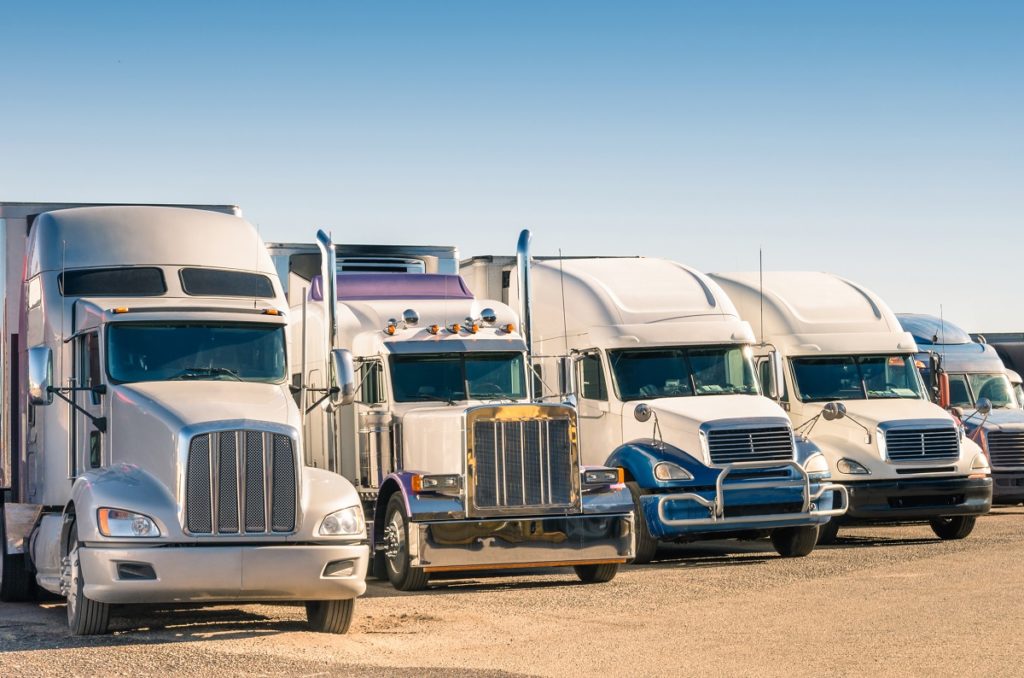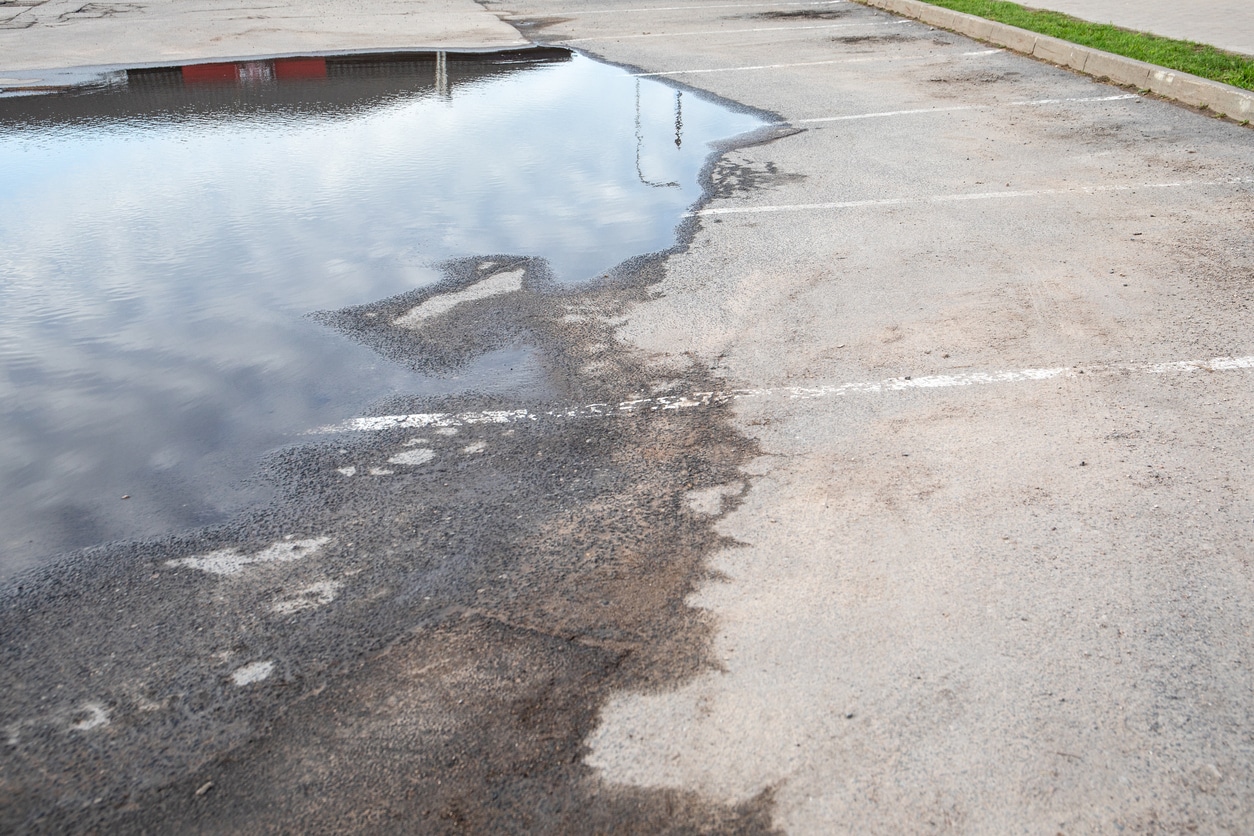If you're undertaking a retail or other commercial construction project, it's important to understand the…

No Parking, Big Problem: The Urgent Need for Safe Truck Parking Lots
The trucking industry is indispensable to the American economy. Apart from many other roles and responsibilities, truckers are responsible for delivering raw materials to where they will be manufactured and finished products to where they will be sold. Businesses both big and small depend on truckers to safely transport their items all across the nation; all while maintaining efficient delivery times. Without trucks, important goods will never be able to get to where they need to be.
With the talk of trucks comes the question of their parking. For years, there has been a truck parking shortage in Kansas City and across the country. This should be a matter of national concern, as the lack of properly paved truck parking lots can lead to fatigued truck drivers, who will then be forced to park in dangerous locations such as on the shoulder of the road, vacant lots, or exit ramps. Truck drivers should be able to park somewhere safe, secure, and accessible.
Additionally, the difficulty of finding truck parking is costing truck drivers 56 minutes a day in lost time. Thus, the lack of truck parking is not just a safety and compliance issue but an economic one, as well.
As Transportation Secretary Pete Buttigieg noted in September 2024 at the unveiling of a new truck parking facility in South Dakota, the parking shortage isn’t just an inconvenience for truckers and a strain on the supply chain. It is a serious safety hazard for the public.
Why is there a Truck Parking Shortage?
The truth is that truck parking is only available in a limited number of places. There are simply not enough spots for all the trucks on the road. A study conducted by the American Transportation Research Institute (ATRI) in collaboration with the American Association of State Highway and Transportation Officials identified the main reasons contributing to truck parking today.
Lack of Funding
A plurality of states (36%) identified lack of funding as a top challenge in acquiring land or right-of-way (ROW) for expanding truck parking. Most states (84%) also do not have dedicated funding specifically for truck parking.
Community Pushback (NIMBY)
Community opposition, often characterized by a “not in my backyard” (NIMBY) mindset, was mentioned by 27% of states as a top issue during land acquisition for truck parking expansion. This pushback can arise from concerns about perceived adverse impacts to the environment, scenery, wildlife, or a disbelief that the project’s benefits outweigh the fiscal cost. Strategies like public hearings have been used to address these concerns, but are not always successful.
Difficulty Locating Suitable Land
Locating suitable land for truck parking expansion was cited by 25% of states as a top challenge in land acquisition
High Construction Costs The average cost for a state to construct one truck parking space was $113,395, with a median cost of $93,500, representing a significant investment barrier.
It is worth reiterating that the biggest reason there isn’t enough truck parking is a lack of funds to cover the expenses. Money is needed to build new parking areas, as well as to maintain them. Since trucks typically weigh 80,000 pounds, truck parking lots have more maintenance issues than regular passenger car parking lots, making upkeep more expensive.
Bridging the Truck Parking Gap: What Can Be Done Now
Resolving the national truck parking shortage isn’t as simple as pouring new concrete overnight. While building more dedicated truck stops and rest areas is the ideal long-term fix, the reality is that funding and infrastructure development take time. In the meantime, there are practical steps we can take to ease the strain on drivers.
1. Expand Real-Time Parking Availability Tools
-
Highway Electronic Signage:
Installing digital signs along key trucking corridors can alert drivers in real-time about parking availability at upcoming rest stops or public lots. This minimizes unnecessary detours and reduces the stress of circling full lots. -
Smart Parking Systems:
Advanced sensors at truck stops can monitor space availability and feed the data to central systems that drivers can access through various channels, including roadside signage and apps.
2. Leverage Truck Parking Apps
-
Use of Free, Real-Time Apps:
Tools like Park My Truck, Trucker Path, and others offer drivers access to up-to-date parking information on the go. These apps allow drivers to:-
Locate nearby parking.
-
View real-time space availability.
-
Filter options by amenities or security features.
-
-
Integration with GPS and Fleet Systems:
Many modern trucking fleets can integrate parking apps into their route planning systems, helping dispatchers and drivers avoid problem areas in advance.
3. Encourage Public-Private Collaboration
While not a quick fix, partnerships between government entities and private logistics companies can help identify underutilized public lots, unused land near industrial parks, or commercial properties that can be temporarily designated for overnight truck parking.
The Importance of Truck Parking

Truck parking is important because truckers need somewhere safe where they could pull over to take a break, eat a quick meal, sleep, or finish up their logbooks. Since there are truck drivers transporting goods at all times, truck parking must be accessible all hours of the day and night, on both weekdays and weekends. Truck drivers need more available parking spread out throughout the U.S. so that they can meet service rest requirements no matter what part of their journey they are on.
Commercial passenger car parking will not do. Aside from needing somewhere well-lit and secure, truck drivers need parking that can accommodate the size of their big rigs. Considering the length and width of these vehicles, truck parking lots must be big enough that trucks – with their wide turning radiuses – can turn and park easily and without worrying about causing an accident.
Safe truck parking is vital, considering the goods that these trucks are hauling. These trucks are transporting thousands of dollars’ worth of raw material and finished products. Truckers should be able to rest without fear of theft or equipment damage. If something happens to the goods that these truckers are transporting, businesses will suffer. Additionally, when there isn’t enough truck parking, truck drivers won’t be able to take certain routes and loads, which, again, can negatively affect the economy.
The extra time that drivers spend just looking for parking also adds to traffic congestion on local roads. This can lead to delays, not only for the truck but also for others on the road. Truckers looking for parking also tend to drive for a longer time, burning more fuel.
Without proper truck parking, the rates of illegal truck parking will rise. Truckers will be forced to park in unsafe locations, such as road shoulders. This poses safety hazards, not only for the drivers but also for other motorists. Parking in illegal areas also obstructs vehicle and bicycle lanes, as well as sight lines at driveways and intersections. The lack of truck parking also adds to truck driver’s stress levels, which can lead to these truckers quitting their jobs, further worsening the truck driver shortage that America is also currently suffering from.
Solution & Business Opportunity: Building More Truck Parking Lots
As you can see, there is a high demand for truck parking in Kansas City and across the country. This demand is likely to remain over the next few years as more and more trucks are being put on the road, with no new truck stops being built for them. As road transport continues to be one of the top modes of freight transportation, the issue of truck parking will persist until it is addressed by either the public or the private sector.
By building a truck parking lot, you will be addressing the issue of the parking shortage and supplying a service or product that is in such high demand. Because of that high demand, you won’t have to worry about your truck parking lot not having any customers. Truck drivers will come to your truck parking lot in droves. If you build a truck parking lot, you’ll be helping not only truck drivers, but also other businesses that rely on trucks to transport their goods, as well as the American economy as a whole.
Starting a truck parking business isn’t just about paving a parking lot for the trucks, however. There are many things to consider, such as the following:
City Truck Parking Bylaws
Most, if not all, municipalities have zoning bylaws that govern which parts of the city will be allocated to the development of facilities. The three most common zones are agricultural, industrial, and residential. More likely than not, truck parking lots can be established only in areas that are zoned as industrial. Truck parking in residential areas is usually allowed only for temporary purposes, and only for small, 5-ton trucks. The bigger, heavier class 8 trucks aren’t permitted to even enter residential areas. Meanwhile, building a truck parking lot in an agricultural area is allowed but only after certain requirements are fulfilled.
Truck Parking Space Dimensions
With or without a trailer, trucks are huge and need enough space in order to turn and park. An average trailer is about 48 feet to 53 feet long, though 53 feet trailers are the most common type. Semi-tractors can be 20 to 25 feet long, depending on the specific truck’s wheelbase. Based on these measurements, it is fair to say that a parking stall for a tractor unit should be at least 30 feet long, with a width of 15 feet, making the space dimensions of a standard truck parking spot at least 450 square feet.
Scouting Potential Truck Parking Facilities
Finding a suitable place for developing your truck parking lot can be difficult. To find some sites where you can build a truck parking lot, you should get acquainted with different zoning classifications in your city. You should also understand the process that it will take to submit a rezoning request so that you can get commercial areas changed to industrial ones, thereby allowing you to build a truck parking lot.
Once you’ve considered these, among others, you can start building your truck parking lot in Kansas City. Once set up, your truck parking lot will be paying for itself. If you’re ready to build a high-quality truck parking lot, then you should turn to K&E Flatwork LLC. With more than a decade’s worth of experience, we work with a variety of businesses in the Kansas City Area and get the job done right. You can rely on our expert team to deliver exceptional work. Get in touch with us today for more information about our company and services.




This Post Has 0 Comments